人教版七年级下册 Unit2 What time do you go to school? SectionB 2a-2c 课件(共19张PPT)
文档属性
| 名称 | 人教版七年级下册 Unit2 What time do you go to school? SectionB 2a-2c 课件(共19张PPT) | 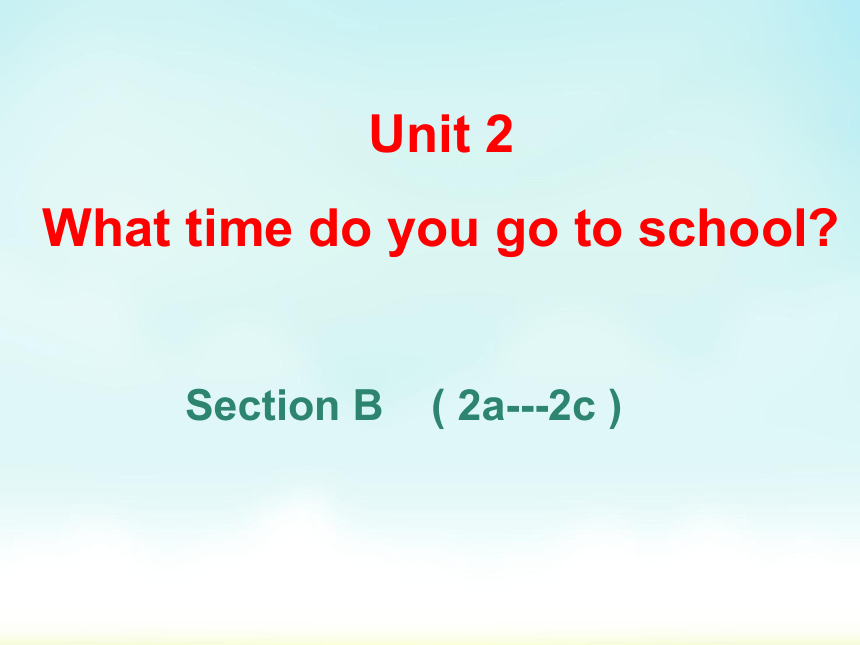 | |
| 格式 | ppt | ||
| 文件大小 | 1.4MB | ||
| 资源类型 | 教案 | ||
| 版本资源 | 人教新目标(Go for it)版 | ||
| 科目 | 英语 | ||
| 更新时间 | 2023-01-10 22:48:54 | ||
图片预览

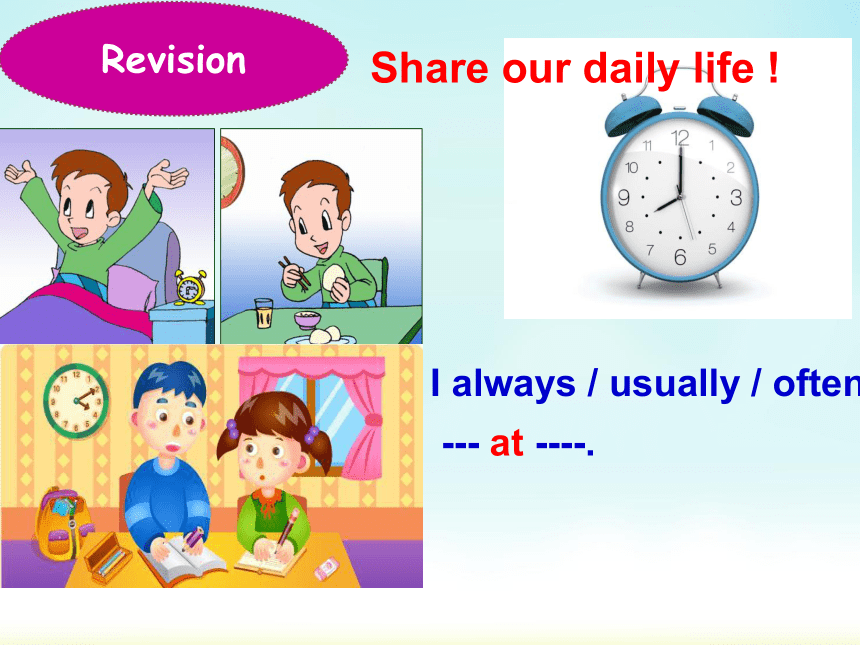
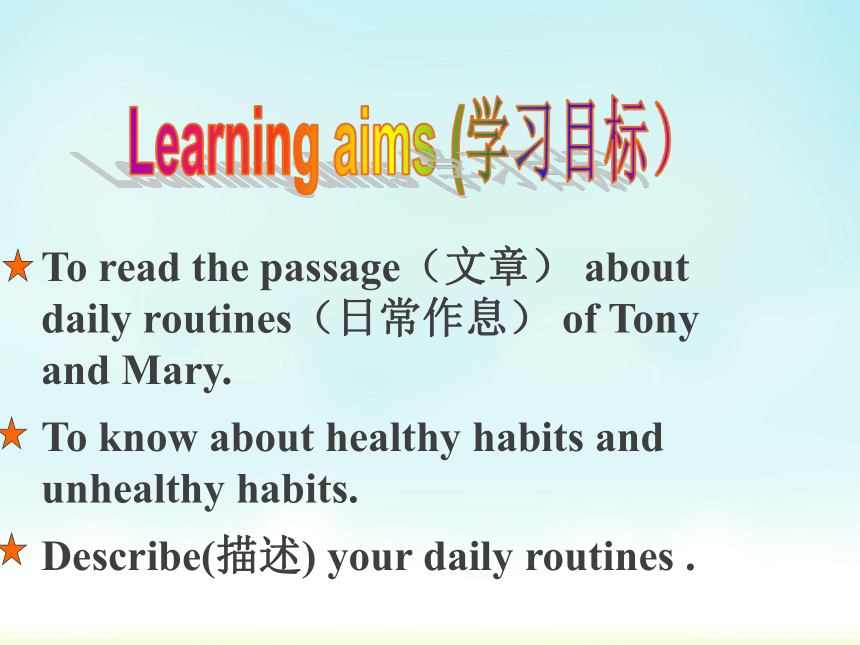
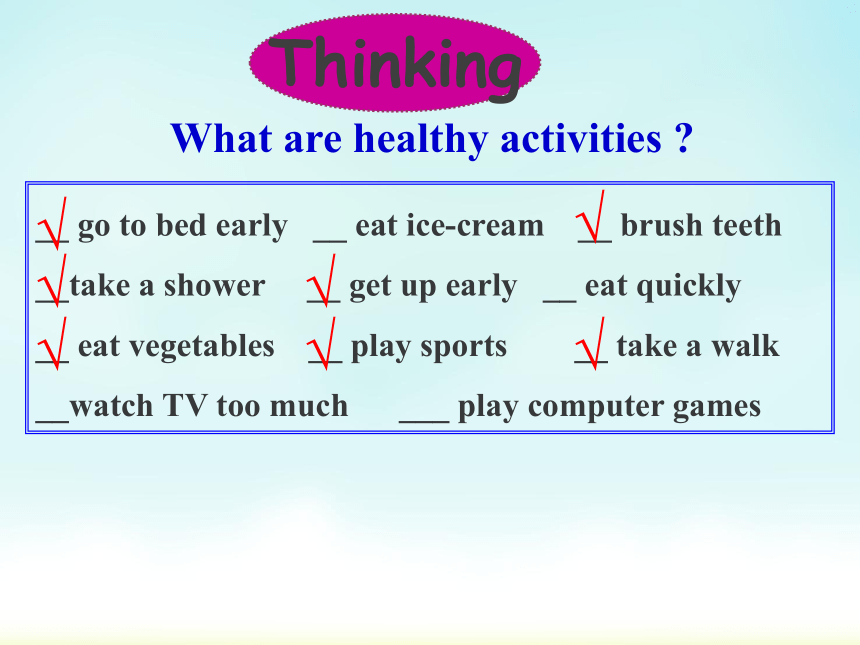
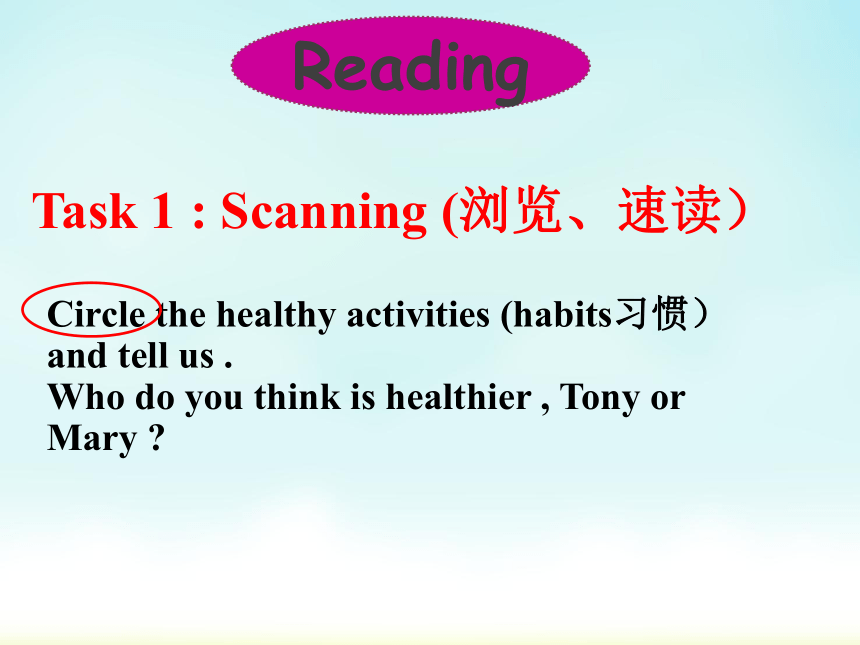

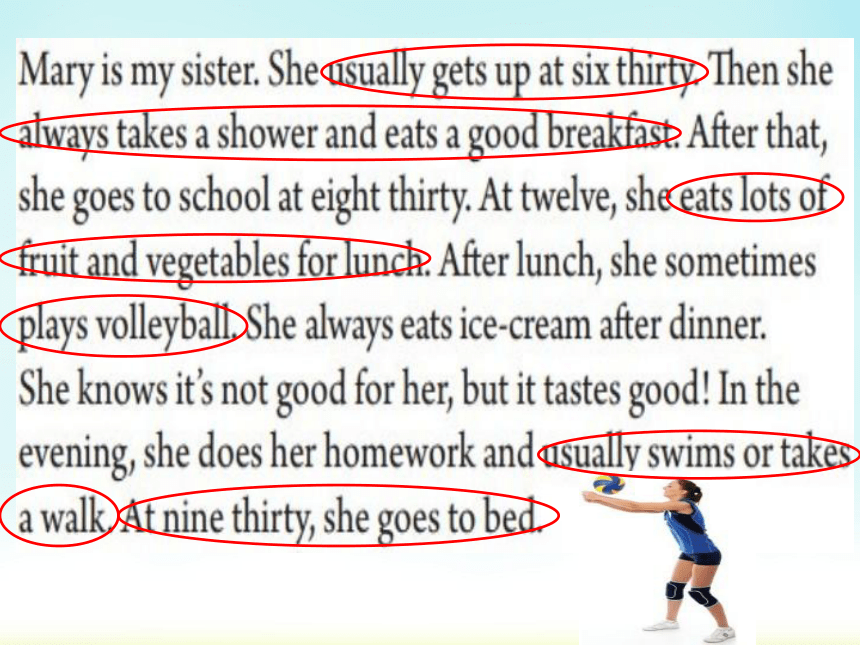
文档简介
(共19张PPT)
Unit 2
What time do you go to school
Section B ( 2a---2c )
Revision
Share our daily life !
I always / usually / often
--- at ----.
To read the passage(文章) about daily routines(日常作息) of Tony and Mary.
To know about healthy habits and unhealthy habits.
Describe(描述) your daily routines .
What are healthy activities
__ go to bed early __ eat ice-cream __ brush teeth __take a shower __ get up early __ eat quickly
__ eat vegetables __ play sports __ take a walk __watch TV too much ___ play computer games
√
√
√
√
√
√
√
Thinking
Circle the healthy activities (habits习惯) and tell us .
Who do you think is healthier , Tony or Mary
Reading
Task 1 : Scanning (浏览、速读)
Task 2 : Skimming (寻读):fill in the blanks.
Time Tony’s Activities
At eight 1__________
At eight thirty 2________________
For lunch 3________________
After school
Get home
In the evening 4_____________________________5____________
6
7___________
brushes teeth and goes to bed
gets up
goes to school
eats hamburgers
plays basketball for half an hour
does his homework first
watches TV or plays computer games
At ten thirty
Time Mary’s Activities
____________ gets up
takes a shower and eats a good breakfast
____________ goes to school
At twelve ____________________________
After lunch
After dinner ______________
______________
in the evening
At nine thirty _________________________________________
goes to bed
At six thirty
At eight thirty
eat lots of fruit and vegetables
plays volleyball
eats ice-cream
does her homework, swims or takes a walk
Write down the unhealthy habits of each person. Then think of healthy activities for them.
Unhealthy habits
Healthy habits
Tony
Mary
not get up early
eat quickly
play basketball
brush teeth
eat ice-cream
eat ice-cream
eat a good
breakfast
take a walk
Task 3 : Postreading (读后活动)
quickly意为“快速地”,副词,修饰动词。
The dog runs quickly. 小狗快速地跑了。
He often eats quickly . 他经常吃得很快。
1. quickly的用法。
拓展:quick adj. ,快的;迅速的。
Tom eats a quick breakfast。
汤姆快速吃完早饭。
Jack eats either hamburgers or sandwiches for lunch.
杰克或者吃汉堡或者吃三明治作午饭。
You can either play chess or play the guitar.
你可以下棋或者弹吉它。
2. either… or… 意为“或者……或者…… ” 连接两个并列名词、代词或句子成份。
3. lots of 与many, much的用法
三个词都有“许多;大量”之意,但
用法不同。
1) lots of 后跟可数名词或不可数名词。如:
He doesn’t have lots of (=many) books/money .
2) many与可数名词复数形式连用。如:
There are many apples in the basket.
篮子里有许多苹果。
3) much表示数量时只能修饰不可数名词。如:
We don’t have much milk.
我没有很多牛奶了。
4. She knows it’s not good for her, but it tastes good!
1) be good for …表示“对……有益/好处”;
be bad for…表示“对……有害/坏处”。
It’s good for our health to go to bed early
and get up early.
早睡早起对我们的健康有好处。
Don’t read in the dark. It’s bad for your eyes.
不要在暗处看书,这对你的眼睛有害。
Apples taste good. 苹果尝起来味道很好。
Does the ice-cream taste nice 冰淇淋的味道尝起来很好吗?
2) taste 意为“品尝 …… 的味道”。是连系动词,后面常跟形容词。
拓展:taste作名词,意为“味道”。
The ice-cream has a taste of lemon.
冰淇淋有点柠檬的味道。
Write down something about what time you get up ,brush teeth , go to school --- ---.
time your activities
小结训练
一、单项选择。
1. Tony doesn't get up early , his brother doesn't get
up early, _______.
A. too B. also C. either D.or
2. Doing exercise is good _____ your health.
A. for B. at C. with D. in
3. We have so _____ meat for dinner .
A. lot B. much C. many D. a lot
C
A
B
二、根据提示完成句子。
1. I do _____ _____ (许多) homework
every day.
2. The food ______ (尝起来) delicious.
3. He doesn't like getting up early,
______ (也).
4. Either you or he _____ (be) wrong.
5. Healthy food is _____ _____ (对......
有好处) us.
lots of
tastes
either
is
good for
Unit 2
What time do you go to school
Section B ( 2a---2c )
Revision
Share our daily life !
I always / usually / often
--- at ----.
To read the passage(文章) about daily routines(日常作息) of Tony and Mary.
To know about healthy habits and unhealthy habits.
Describe(描述) your daily routines .
What are healthy activities
__ go to bed early __ eat ice-cream __ brush teeth __take a shower __ get up early __ eat quickly
__ eat vegetables __ play sports __ take a walk __watch TV too much ___ play computer games
√
√
√
√
√
√
√
Thinking
Circle the healthy activities (habits习惯) and tell us .
Who do you think is healthier , Tony or Mary
Reading
Task 1 : Scanning (浏览、速读)
Task 2 : Skimming (寻读):fill in the blanks.
Time Tony’s Activities
At eight 1__________
At eight thirty 2________________
For lunch 3________________
After school
Get home
In the evening 4_____________________________5____________
6
7___________
brushes teeth and goes to bed
gets up
goes to school
eats hamburgers
plays basketball for half an hour
does his homework first
watches TV or plays computer games
At ten thirty
Time Mary’s Activities
____________ gets up
takes a shower and eats a good breakfast
____________ goes to school
At twelve ____________________________
After lunch
After dinner ______________
______________
in the evening
At nine thirty _________________________________________
goes to bed
At six thirty
At eight thirty
eat lots of fruit and vegetables
plays volleyball
eats ice-cream
does her homework, swims or takes a walk
Write down the unhealthy habits of each person. Then think of healthy activities for them.
Unhealthy habits
Healthy habits
Tony
Mary
not get up early
eat quickly
play basketball
brush teeth
eat ice-cream
eat ice-cream
eat a good
breakfast
take a walk
Task 3 : Postreading (读后活动)
quickly意为“快速地”,副词,修饰动词。
The dog runs quickly. 小狗快速地跑了。
He often eats quickly . 他经常吃得很快。
1. quickly的用法。
拓展:quick adj. ,快的;迅速的。
Tom eats a quick breakfast。
汤姆快速吃完早饭。
Jack eats either hamburgers or sandwiches for lunch.
杰克或者吃汉堡或者吃三明治作午饭。
You can either play chess or play the guitar.
你可以下棋或者弹吉它。
2. either… or… 意为“或者……或者…… ” 连接两个并列名词、代词或句子成份。
3. lots of 与many, much的用法
三个词都有“许多;大量”之意,但
用法不同。
1) lots of 后跟可数名词或不可数名词。如:
He doesn’t have lots of (=many) books/money .
2) many与可数名词复数形式连用。如:
There are many apples in the basket.
篮子里有许多苹果。
3) much表示数量时只能修饰不可数名词。如:
We don’t have much milk.
我没有很多牛奶了。
4. She knows it’s not good for her, but it tastes good!
1) be good for …表示“对……有益/好处”;
be bad for…表示“对……有害/坏处”。
It’s good for our health to go to bed early
and get up early.
早睡早起对我们的健康有好处。
Don’t read in the dark. It’s bad for your eyes.
不要在暗处看书,这对你的眼睛有害。
Apples taste good. 苹果尝起来味道很好。
Does the ice-cream taste nice 冰淇淋的味道尝起来很好吗?
2) taste 意为“品尝 …… 的味道”。是连系动词,后面常跟形容词。
拓展:taste作名词,意为“味道”。
The ice-cream has a taste of lemon.
冰淇淋有点柠檬的味道。
Write down something about what time you get up ,brush teeth , go to school --- ---.
time your activities
小结训练
一、单项选择。
1. Tony doesn't get up early , his brother doesn't get
up early, _______.
A. too B. also C. either D.or
2. Doing exercise is good _____ your health.
A. for B. at C. with D. in
3. We have so _____ meat for dinner .
A. lot B. much C. many D. a lot
C
A
B
二、根据提示完成句子。
1. I do _____ _____ (许多) homework
every day.
2. The food ______ (尝起来) delicious.
3. He doesn't like getting up early,
______ (也).
4. Either you or he _____ (be) wrong.
5. Healthy food is _____ _____ (对......
有好处) us.
lots of
tastes
either
is
good for
同课章节目录
- Unit 1 Can you play the guitar?
- Section A
- Section B
- Unit 2 What time do you go to school?
- Section A
- Section B
- Unit 3 How do you get to school?
- Section A
- Section B
- Unit 4 Don't eat in class.
- Section A
- Section B
- Unit 5 Why do you like pandas?
- Section A
- Section B
- Unit 6 I'm watching TV.
- Section A
- Section B
- Review of Units 1-6
- Unit 7 It's raining!
- Section A
- Section B
- Unit 8 Is there a post office near here?
- Section A
- Section B
- Unit 9 What does he look like?
- Section A
- Section B
- Unit 10 I'd like some noodles.
- Section A
- Section B
- Unit 11 How was your school trip?
- Section A
- Section B
- Unit 12 What did you do last weekend?
- Section A
- Section B
